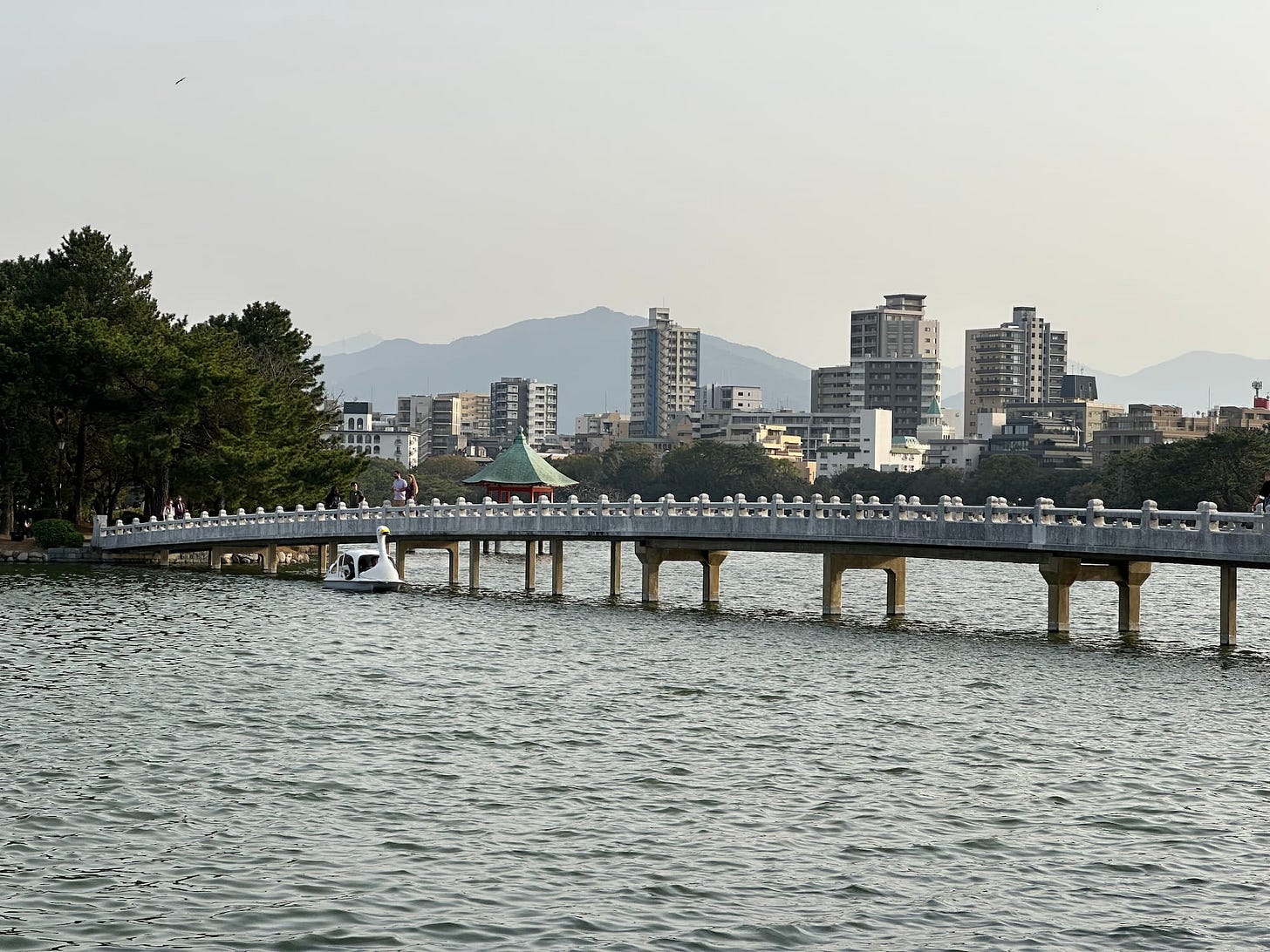I felt at home immediately when we arrived in Fukuoka, despite the language barrier.
I can't quite explain it, but there was something familiar about the streets, buildings and parks. Perhaps it reminds of Australia, but there is something more - it's my kind of city.
The people
In my experience, the people of Fukuoka have been very friendly and curious about my life as a digital nomad. I felt it was much easier to make friends here compared to Tokyo. The city is quite small, so communities are tight-knit and everybody knows each other. This makes it easier to meet new people.
Before coming to Japan, I was worried I wouldn’t connect with anyone regarding work life. It’s hard for me to relate to the mindset of a typical Japanese salaryman, having been a freelancer most of my life. I'm more likely to connect with small business owners.
That turned out not to be a problem. I’ve met many people here who are building businesses and pursuing their passions. I’ve had great conversations with gym and cafe owners, community managers, tour guides and other small businesses. There is a lot to discuss, and I see many opportunities for collaboration.
As a web developer and e-commerce expert, I’ve had various ideas, such as becoming a “bridge agency” or “western growth partner” - helping translate and adapt websites of Japanese companies that want to reach a western audience.
However, I could not imagine myself working for a Japanese company full-time. It would be difficult to adapt to the working culture here.

Overall, I feel very comfortable in Fukuoka. I felt like more of an outsider in many European countries.
Fukuoka city
Ignoring these subjective feelings, Fukuoka is for sure, a great city for digital nomads.
It is very compact, making it easy to walk to many places. It’s not a car city like Bangkok or Sydney. Or one where you need to spend hours on the subway like Tokyo.
Surprisingly, despite being a city of more than 2 million, the small streets are mostly empty of cars. Even on large roads, there is not much traffic, and often you can walk around at night and not see any cars on the road.
Our first Airbnb was on a road, so when booking, I was worried about noise and pollution - would we be able to sleep at night with cars rushing past?

It wasn't a problem; there are no cars at night, and even during the day, they pass by rarely, slowly, and quietly.
The public transport is also really good - and it's easy to use the metro with the new tourist-friendly Suica mobile app - just add prepaid credit and tap on to the metro or buses. It’s about $1.77 to go most places.
Fukuoka has an abundance of working spaces, having hosted Co-live Fukuoka in 2024 (I’ll be attending the 2025 event, by the way, so get in touch if you’re going). The cafes are also quite laptop-friendly.
It is Japan after all - people work a lot, so it’s a nice place to work from. I’m also often inspired to work harder and do better quality work.
Fukuoka is also surrounded by nature, and being so compact, it is easy to get out of the city. The mountains are always visible on the horizon, and there is a lot of coastline if you love beaches and swimming, surfing or fishing.

So it's not just a city to work from, it's also a place where you can easily enjoy the Japanese countryside and nature.
The downsides of Fukuoka for digital nomads
The cost and difficulty of finding longer-term accommodation (1-3 months) is the biggest downside of Fukuoka, and Japan in general.
The ironic thing is that in Fukuoka there are so many nice apartments on the rental market, perfect for an early-30s nomad or a couple, in the range of $800/month.
However, most of them are not an option for digital nomads because of the difficulty of renting them for a short-term (3 months).
Instead, we must compete with tourists for hotels and Airbnbs. Where the average cost is more like $2000/month.
When looking at hotels and Airbnbs, finding something that isn’t booked for 3 months is nearly impossible. So you need to book a few different places to cover your stay, and just move around the same city several times because your term is over.
In fact, we decided to take a short 10-day trip to Osaka and back, just because we couldn't find a decent place in Fukuoka for this period at short notice.
Perhaps if Japan's digital nomad visa was extended to 1 year instead of just 6 months, this problem would be mostly solved.
A 1-year rental would be much easier to find and would make it much cheaper to stay in Fukuoka.
Fukuoka as a base camp?
Ultimately, if you really love Fukuoka and want to treat it as a digital nomad base where you can return several times a year, then the best option would be to buy a small apartment.
You can find a studio apartment in good condition for around 10 million yen ($70k USD as of April 2025). The catch is you won't get a mortgage as a foreigner, so you need to buy this outright.
This is out of reach for me right now, but I know it's becoming a popular idea. Lots of wealthy asians (e.g. Singaporeans) buy an apartment or even a house in Japan as a holiday home. It's become a dream of mine too.
You can check GaijinPot Apartments for real estate listings.
Check out my costs of living in Japan post if you're interested in how much I'm spending here.
Questions? Leave a comment here or message me on Instagram.
Subscribe for more!













Discussion